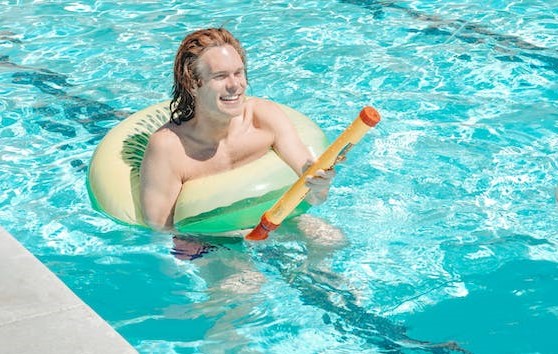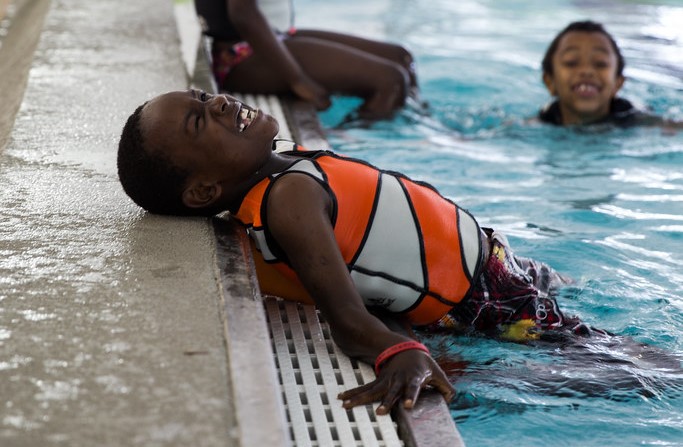Here is Why It Is Possible To Forget How To swim and What To Do
Swimming is not just a recreational activity; it’s a life skill that offers numerous health benefits.
Whether you’re gliding through the water for exercise, competing in races, or simply enjoying the tranquility of a pool, swimming engages both body and mind.
But what happens when you take a break from swimming for many years? Can you truly forget how to swim?
This is a complex question, one that requires us to even look at how the mind works, particularly how it deals with memories. Therefore, we’ll dive into the fascinating world of memory and explore how it impacts our ability to swim.
From short-term memory lapses to long-term skill retention, let’s unravel the mysteries of forgetting and relearning.
Can you ever forget how to swim? Short-term vs. Long-term memory

Memory is a complex process involving encoding, storing, and retrieving information. When it comes to swimming, our brains rely on two main types of memory:
Short-Term Memory (Working Memory): This is our active consciousness—the place where we temporarily hold information. Think of it as a mental sticky note where you jot down details. Short-term memory can retain about 7 items for 15 to 30 seconds. If reinforced, this information may transfer to long-term memory.
Long-term memory comes in two main types. These are:
Declarative Memory (Explicit Memory): This type stores facts and events that we can consciously recall. For swimmers, declarative memory helps us remember swimming stroke techniques, breathing patterns, and safety precautions.
Procedural Memory (Implicit Memory): Here lies the magic of swimming. Procedural memory stores skills and habits that we can unconsciously perform. It is this memory that allows us to ride a bike, play an instrument, and yes, swim.
The Forgetfulness Factor
When can you forget how to swim? It depends on a few things, the major one being your swimming skill level.
New Swimmers: If you are just learning to swim, your knowledge resides in short-term memory. In this case, yes, you can forget how to swim since it has not transitioned to long-term memory.
Experienced Swimmers: If you have swum enough in the past, your swimming skills are etched into your long-term memory. You might feel rusty after a hiatus, but true forgetfulness is unlikely to happen.
Can you lose the ability to swim?
Most of us picture swimming as a skill ingrained in our bodies once learned, like riding a bike. But can you actually lose the ability to swim after mastering it?
The answer is yes if you experience the following things:
Swimming skills fade away
Like any physical activity, without consistent practice, your swimming skills can become rusty. The memory weakens, technique gets sloppy, and endurance diminishes.
This “detraining” happens to professional athletes too! If you haven’t hit the pool for a while, don’t worry; getting back to where you were is usually much faster than learning from scratch.
Physical limitations
As we age, physical changes like decreased muscle strength, flexibility, and cardiovascular health can impact swimming ability.
Injuries or medical conditions might also introduce limitations. However, this doesn’t mean you have to abandon swimming entirely. Adapted techniques and water exercise programs can often keep you enjoying the water.
Psychological factors
Fear of water, anxiety, or negative experiences such as a near drowning in the open water can impede someone’s ability to swim, even if they have the skill.
This is why overcoming water phobia often involves gradual reintroduction to the water and building confidence.
In rare cases, neurological conditions affecting motor skills or coordination can impact a person’s swimming ability. This typically requires specialized therapy and support.
Remember: Losing the ability to swim doesn’t have to be permanent! Consistent swimming practice, seeking guidance from instructors, and adapting to physical changes can help anyone, at any age, enjoy the benefits of swimming.
Key points to remember
- Lack of practice leads to skills fading, but regaining them is easier than starting fresh.
- Age and physical limitations can affect swimming, but adaptations are possible.
- Psychological factors and neurological conditions might require specialized support.
- Don’t hesitate to get back in the water, even after a break!
How do you swim after not swimming for years?

So, now, we have established that it is possible to lose at least a part of your swimming skill, if you stay too long before getting into the pool. But now, you have moved close to a lake, or you are going to Israel, and you would like to swim in the Dead Sea.
So, you want to know how you can swim again after taking a break for years. I will show you how:
1. Take Your Time
Don’t rush back into the water. Start with gentle strokes and gradually build confidence.
Reacquaint yourself with the pool environment. Feel the water, listen to its soothing sounds, and let muscle memory kick in. Feel again how it feels to float in the pool.
2. Don’t swim alone
Buddy up! Swimming with a friend or instructor provides safety and encouragement.
Socializing in the water can ease your anxiety and boost motivation a great deal. If you feel the need to use swimming aids like floaties, use them. Don’t be afraid.
3. Take swimming lessons again!
Even seasoned swimmers benefit from extra lessons. A skilled swimming instructor can fine-tune your technique and address any forgotten nuances.
Brush up on the swimming strokes, turns, and dives. Remember, practice makes perfect.
Important things about forgetting to swim
You can try to identify the reason why you forgot to swim. Was it time spent out of the water or other things? Here are two important things to know:
You have traumatic memories of swimming
Some people develop fear or anxiety related to water due to past incidents. Seek professional guidance if you struggle with water-related trauma.
Gradual exposure and positive reinforcement can help overcome these fears.
Safety first
Be aware of your surroundings. Avoid swimming in water that is too deep for your comfort level.
Stick to designated swimming areas in pools and open water, and follow the posted swimming pool rules and regulations.
Frequently Asked Questions
I haven’t swum in years; will I have completely forgotten how?
While your swimming skills might be rusty from lack of practice, you won’t have completely forgotten how to swim. Muscle memory holds onto skills even through periods of inactivity. You might need some time to re-acclimate to the water and regain your technique, but it’ll come back much faster than learning from scratch. And you will enjoy the benefits of swimming daily for a month.
I used to be a strong swimmer, but now I get tired quickly. What’s happening?
Your cardiovascular fitness and muscle strength likely decreased when you stopped swimming regularly. This is completely normal. With consistent practice, you can rebuild your endurance and strength, gradually returning to your previous level or even surpassing it.
I’m worried about water now, even though I used to love swimming. Can I overcome this fear?
Absolutely! Water phobia is very real, but it can be addressed with the right support. Consider gradual reintroduction to the water, starting with shallow depths and activities like floating or water walking. Working with a qualified swim instructor who understands anxiety can also be incredibly helpful.
I have some physical limitations now. Can I still swim?
Definitely! Swimming is a fantastic low-impact exercise that can be adapted to various abilities. Depending on your specific limitations, there might be specific techniques or equipment that can help you enjoy the water safely and comfortably. Consulting a physical therapist or swim instructor experienced with adaptive aquatics can provide personalized guidance.
I heard that swimming skills fade with age. Is that true?
It’s partially true. As we age, natural changes in muscle strength, flexibility, and cardiovascular health can affect swimming ability. However, this doesn’t mean you have to stop swimming! Regular exercise, including swimming, can actually help mitigate these age-related declines. Additionally, focusing on proper technique and water safety becomes even more important as we get older.
Also, check out my past posts on:
Can you swim in the ocean with a yeast infection?
Can you swim with a herpes outbreak?
Conclusion
Remember, swimming is like riding a bike, it is hard to forget once it’s ingrained.
So, whether you’re diving back in after years or just starting, trust your memory, embrace the water, and let the strokes flow.
Give yourself time. You won’t get the finesse back in a day. Once you decide to retrain for swimming, it is going to take time and practice.
